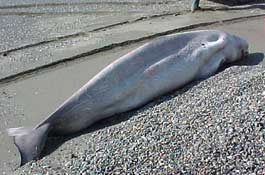Alaska Marine Mammal Stranding Network
How to Report Marine Mammal Strandings

Dead beluga whale on a beach. Photo: NOAA Fisheries
Let us know if you see injured, entangled or dead marine mammals in the water or on the beach. The most important information to collect is the date, location of stranding (including latitude and longitude), number of animals, and species. Please don't move or touch the animal.
Online Reporting Form(for the general public)
Stranding Report Phone Numbers
- Protected Resources Office:
- Juneau: (907) 586-7235
- Anchorage: (907) 271-5006
- NMFS 24 Hour Hotline: (800) 853-1964
- Alaska SeaLife Center Stranding Hotline: (888) 774-7325
More Information
Alaska Stranding Summaries
Regulations
- 73 FR 46869, August 12, 2008. Notice of NMFS Marine Mammal Health and Stranding Response Program evaluations of the six NMFS regional stranding networks: Northeast, Southeast, Southwest, Northwest, Alaska, and Pacific Islands Regions. Written comments and recommendations to be accepted through September 12, 2008.
- 73 FR 16617, March 28, 2008. Extension of comment period for the ANPR on revisions to implement regulations governing the taking of stranded marine mammals. Comment period extended through April 30, 2008.
- 73 FR 5786, January 31, 2008. NMFS proposes to change the implementation regulations governing the taking of stranded marine mammals under section 109(h), section 112(c), and Title IV of the Marine Mammal Protection Act. Comment period through March 31, 2008.
Stranding Publications
- Preliminary Summary of Reported Whale-Vessel Collisions in Alaskan Waters: 1978-2006, Gabriele et al., 2009
- Programmatic Environmental Impact Statement (PEIS) on the Marine Mammal Health and Stranding Response Program (MMHSRP), February 2009
- Alaska Fisheries Science Center Publications Database (Search for "strandings" and select NMML)
- Marine Mammal Strandings in Alaska: Selected References
- National Marine Mammal Stranding Database
- Health and Safety Information for Marine Mammal Workers (external website link)
Stranding Network Members
ALASKA: (external website links)- Alaska Department of Fish and Game
- Alaska Sea Grant Marine Advisory Program
- Alaska Sealife Center
- The Alaska Sea Otter and Steller Sea Lion Commission
- The Alaska Whale Foundation
- Bridge Veterinary Services, LLC
- Glacier Bay National Park and Preserve
- NOAA Fisheries Alaska Region
- North Gulf Oceanic Society
- The Petersburg Marine Mammal Center
- St. Paul Island, Tribal Government, Fur Seal Disentanglement Project
- U.S. Fish and Wildlife Service, Alaska Region
NATIONAL:
- Marine Mammal Health and Stranding Response Program
- Prescott Marine Mammal Rescue Assistance Grant Program
- Unusual Marine Mammal Mortality Events Working Group
Research
- National Marine Mammal Laboratory
- Alaska Marine Mammal Tissue Archival Project (external website)
- Armed Forces Institute of Pathology Department of Veterinary Pathology (external website)
- University of Alaska Museum Specimen Database (external website)
About the Stranding Network
The Alaska Region Marine Mammal Stranding Network was created to provide a consistent framework in which to collect and compile data about marine mammal strandings throughout the entire state. The network is composed of state and federal wildlife and fisheries agencies, veterinary clinics, Alaska Native organizations, academic institutions, and individuals who respond to or provide professional advice on handling strandings.
Strandings occur when marine mammals swim or float into shore and become "beached" or stuck in shallow water. In most stranding cases, the cause of the stranding is unknown; some identified causes have included pup abandonment, injuries from ship strikes or fishery entanglements, pollution exposure, trauma, and starvation. While most stranded animals are found dead, some strand alive. In a limited number of cases it's possible to transport individuals to regional rehabilitation centers for care, where they are treated with the objective of returning them to the wild. In the Alaska Region, the Alaska SeaLife Center in Seward handles all marine mammal rehabilitation.
Stranded animals may provide information on geographical distribution, feeding habits, reproduction, age distribution, diseases, parasites, and contaminant levels. If strandings are reported quickly, the network also may facilitate the rapid identification of mass mortalities or strandings caused by disease or toxicity/pollution problems. By conducting necropsies on dead stranded animals, it is also possible to learn more about the basic physiology and biology of animals not accessible in the wild or by any other means. Necropsies also have provided data on the incidence of human interactions including ship strikes, shootings, entanglements, and marine debris ingestions. These data help NMFS to make better management decisions about these stocks of marine mammals.
Without authorization from NMFS, the public cannot pick up stranded marine mammals. However, assistance in documenting the incident is helpful and will allow stranding network members to respond. The most important information to collect is the date, location of stranding (including latitude and longitude), number of animals, and species, if known. This information can be given to NMFS online via the Marine Mammal Stranding Event Report Form. Or, by phone:
- Protected Resources Office:
- Juneau: (907) 586-7235
- Anchorage: (907) 271-5006
- NMFS 24 Hour Hotline: (800) 853-1964
- Alaska SeaLife Center Stranding Hotline: (888) 774-7325
Specimens of the small or rare cetaceans, especially those that are in good condition, may be of interest to museums. Researchers sometimes need specific tissues from other species for various projects. The stranding network office in Juneau will help to establish communication among stranding network members and between museums and researchers and persons or agencies that report strandings.